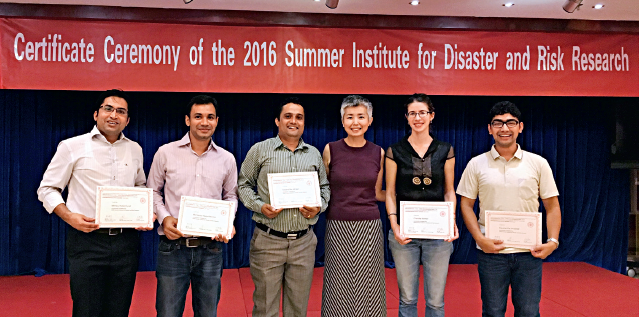Protecting people from natural disasters
- By Zhang Li
 0 Comment(s)
0 Comment(s) Print
Print E-mail China Today, June 20, 2017
E-mail China Today, June 20, 2017
|
|
|
Professor Yang poses for a photograph with students from Nepal, the U.K. and Bangladesh at an international summer training program on disaster and risk research in 2016. [Photo/China Today] |
The spirit of giving
In recent years, China has made great progress in disaster prevention, reduction and relief, and has accumulated valuable experience when dealing with large-scale natural disasters. In December 2016, the Chinese government issued its "Opinions on Promoting Reform to the System and Mechanism of Disaster Prevention, Mitigation and Relief," as well as the "National Comprehensive Plan for Disaster Prevention and Mitigation (2016-2020)." However, it is clear that China still faces a daunting situation when dealing with various types of natural disasters.
"Our mechanism should be further improved, but another problem is that our people's awareness of disaster prevention is still weak and they don't know how to help each other during disasters," Yang pointed out.
She often goes to remote areas frequently hit by natural disasters to conduct investigations and research, and she found that people rely heavily on the government during disaster relief, and they are not aware that they can help themselves when disasters strike. "Many people don't know about the fact that after an earthquake, most survivors are saved through their own efforts or help by other victims," said Yang.
Meanwhile, what also worries Yang is that government officials often focus more on disaster relief rather than disaster prevention, as it is difficult to see the benefits of making an investment before disasters actually occur. Yang's team is working on building models to show that investment in disaster prevention can effectively reduce risks. That is to say, through the model, people can see the benefits of disaster prevention measures clearly.
Yang said frankly that the task of training community residents to help enhance awareness of disaster prevention and participate in community-based disaster relief work is not always well-recognized. "Because after all this effort we may not be able to write an academic paper; we may not be able to win support from national programs, and it is difficult to evaluate the effectiveness of our work. But I believe we should have the spirit of giving. Scholars should play their parts to serve the society," said Yang.
Yang said that she hopes the media can help publicize more information about disaster risk reduction, teach people how to save themselves and help other victims when disasters hit and enhance their awareness of natural hazards. Through years of practice, Yang and her team members found that it is difficult to help elderly people in remote areas with a low level of education to learn and accept new information, so they now focus on students in elementary and middle schools, and let the young influence their parents.
International cooperation
The International Center for Collaborative Research on Disaster Risk Reduction was established at Beijing Normal University at the end of 2015. Having established partnership with the U.K., Bangladesh and Nepal, it is committed to promoting collaborative research in core technologies and cutting-edge topics aimed at reducing disaster risks, strengthening academic ties in South-South cooperation, and helping other developing countries such as Nepal and Bangladesh. Yang was appointed director of the center.
"We plan to establish a network for international collaborative research into disaster risk reduction, building a platform for global research institutions engaged in disaster risk reduction, emergency management and post-disaster rebuilding to communicate and learn from each other," said Yang.
According to Yang, since the center was established, a series of cooperation projects have been carried out. Yang said that she found that cooperation is never just about technology and products. The key is to understand the needs of partners and reach a consensus through extensive consultation; therefore, an effective cooperation mechanism should be established.






